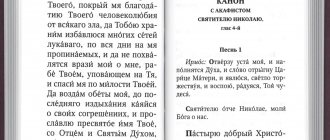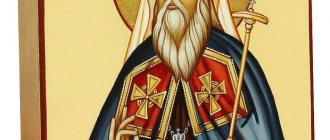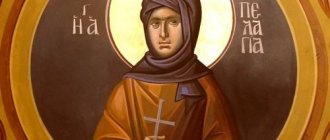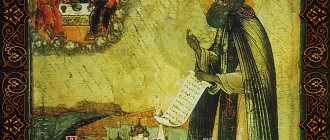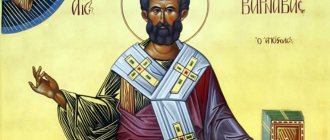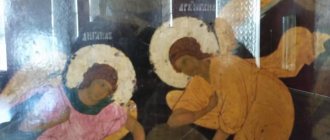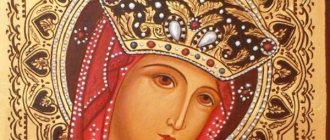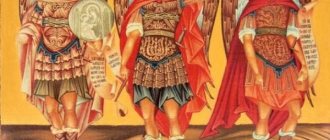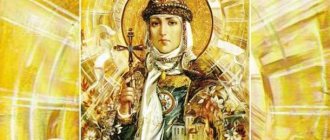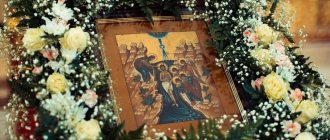Seven Holy Maccabee Martyrs
The history of Christianity knows many cases when followers of Christ suffered for their faith. But the seven Maccabean sufferers are one of the most unfortunate images. The martyrs became a canonical image for the entire Christian world. They showed what suffering a person can endure if he has strong faith. In addition to their own torment, the brothers suffered a severe shock from the sight of their relatives being tortured, but even this did not break them.
The narrative of suffering is associated with the peculiarities of the reign of Antiochus Epiphanes. The ruler was famous for his worship of paganism. He ostracized the faith, destroyed the temple on the territory of Jerusalem, then placed a statue of Zeus there so that the Jews would worship only him.
| ◦◦◦◦◦◦◦◦◦◦◦◦◦◦◦◦◦ ◦◦◦◦◦◦◦◦◦◦◦◦◦ Back August 1/August 14 Further ◦◦III◦◦◦◦VII◦VIII◦◦◦◦XII | Lives of the Saints | ◦ Search ◦ |
According to St. Dimitry Rostovsky:
The origin (wear and tear) of the honorable trees of the Life-giving Cross of the Lord;
The Seven Maccabean Martyrs: Abima, Antoninus, Gurias, Eleazar, Eusevo, Alim and Markellus, their mother Solomonia and their teacher Eleazar;
Mchch. in Perga Pamphylia: Leontius, Attia, Alexandra, Cyndea, Minsitheus, Cyriacus, Mineon, Katun and Eukleia.
According to St. Theodosius of Chernigov:
Feast of the All-Merciful Savior and the Most Holy Theotokos.
The suffering of the holy Old Testament martyrs Eleazar the priest, the seven Maccabee brothers, their mother Solomonia and others with them
P
Before starting the story about the sufferings of the holy martyrs, whose names here on earth are written in the “Books of Maccabees”, and in heaven - in the books of eternal life, it is appropriate, in the form of a short preface, to first report on the unrest that took place in those years in Jerusalem and about the persecution of pious Jews who kept the law of God; both were first stirred up by the lying teachers of the law and the power-hungry high priests of Jerusalem; when, by the permission of the angry Lord, the Jews fell under the power of pagan peoples, these unrest and persecutions intensified to such an extent that the holy city was filled with blood and the sanctuary of God with abominations.
The first great and terrible destruction of Jerusalem, carried out by the Babylonian king Nebuchadnezzar, took place in the days of the king of Judah Zedekiah, as reported in the life of the holy prophet Jeremiah and in the life of the holy prophet Ezekiel. Seventy years after this devastation, the Jews, by the mercy of God, got rid of captivity and returned to Jerusalem; beautiful buildings again arose in the holy city, and the newly built temple of God, like the first, was splendidly decorated; this story of the return from captivity, the renewal of Jerusalem and the temple is described in detail in the books of Ezra and Nehemiah. The number of God's people increased rapidly: they soon settled throughout Palestine in the same order and almost in the same numbers as before; the holy city, faithful to the law of God, flourished for a long time in piety, enjoying peace under the control of its high priest-princes. He enjoyed fame and respect from everyone, although he was under the authority of pagan kings. Many pagan kings and princes, being idolaters, nevertheless honored the God of Israel and sent gifts to the temple of the Lord in Jerusalem (2 Macc. 3:2); they also treated the high priests with special respect; for example, Alexander, king of Macedon, seeing the high priest Adda come out to meet him, bowed to the ground; Having entered Jerusalem and the temple of God, he brought gifts and sacrifices to the Lord of hosts. Other pagan kings did the same. The Egyptian king Ptolemy Philadelphus sent many gifts to Jerusalem to the temple of the Lord and wrote to the high priest Eleazar, asking him to send books of Holy Scripture and knowledgeable men who could translate them from Hebrew into Greek; the successor of Ptolemy Philadelphus, Ptolemy Philopator, having defeated the Syrian king Antiochus the Great, came to Judea, and in Jerusalem, in the temple of the Lord, offered a thanksgiving sacrifice to the one true God. Likewise, Antiochus the Great, having in turn defeated the Egyptians, came to Jerusalem to worship the true God; in the holy temple he made many sacrifices with prayers of thanksgiving and generously presented gifts to the high priest and other Jewish leaders. Jerusalem and the temple of God were held in such respect by the pagans; Holy Scripture also mentions this when it says that the kings themselves revered the place and glorified the church with great gifts (cf. 2 Macc. 3:2). A similar attitude on the part of the pagans towards Jerusalem continued until its leaders, being in the fear of God, kept the law of the Lord, leading a godly life; when they forgot the law of God, then, as before, numerous disasters befell them. They started from the following circumstance.
In the days of the righteous high priest Simon, praised in the book of Jesus son of Sirach (50:1), when Seleucus, the son of Antiochus the Great, reigned in Asia and Syria, there was in Jerusalem a certain man named Simon, who came from the tribe of Benjamin; he was entrusted with the management of the temple treasures, the management of church servants and the leadership of the soldiers who made up the church guard. Out of pride and hatred, he always resisted the high priest and caused unrest among the people; Unable to bear the threats and admonitions that the high priest was often forced to make to him, Simon decided to do evil not only to the latter, but to the entire church. For this purpose, he went to the military leader of Syria and Phenicia Apollonius and reported that in the vaults at the temple there were countless riches, where, along with church treasures, immense treasures belonging to the entire people were kept, and he added that all these riches could pass into the hands of the king (2 Macc.3:5-6). Apollonius conveyed Simon's message to the king, who was distinguished by his greed. The latter immediately sent the custodian of the royal treasures, Iliodorus, to Jerusalem with an army to take the said treasures to the royal repository. When Iliodor, upon arrival in Jerusalem, began to take away the church wealth and rob the money collected and stored to feed the poor and strangers, widows and orphans, then, as Chapter 3 of the second book of Maccabees reports in detail, he suffered God's punishment: he was subjected to such cruel scourged by the angels, that he almost died, and therefore was forced to return to the king without fulfilling his orders. Soon after this, King Seleucus was killed by his entourage; he was succeeded by his brother Antiochus, nicknamed Epiphanes, that is, the bright one; he was even more depraved than his predecessor. Some more often called Antiochus Epiminus, that is, crazy: he madly rebelled against the true God and His temple, revealing the image of the future Antichrist. Great turmoil arose in Jerusalem. The brother of the high priest Onias, Jason, wanting to receive the hierarchy, went to the king and bought the rank of high priest from him for a large amount of money. Wanting to please the king, this unworthy power-lover expressed to him his love for Hellenic civil laws, morals and customs and promised to introduce them among the Jews: having received the power of the high priest for his money and promises, Jason deprived his brother, Saint Onias, of it, and began to replace the existing Jews have good civil laws to introduce pagan lawlessness. At the foot of Mount Zion, he built places for spectacles, schools in which Greek philosophical teachings took place, and he also built palaestres for the games of young men; Jason even established, contrary to the direct prohibition of the law, houses of fornication in the holy city, where adultery was committed with impunity; these obscene houses were visited mainly by young men studying the Hellenic arts. Having introduced Hellenic wickedness into Jerusalem, Jason turned many away from true worship of God, so that even the priests left the temple of God for spectacles, races, wrestling and other pagan games and outrages; People who were young and unsteady in the law were even more carried away by them: they praised Hellenic laws and customs and, forgetting the law of God, easily inclined towards wickedness. People who are firm in the law and truly pious, seeing the iniquities being committed in Jerusalem, could not help but sigh over the destruction of the covenant of the Lord and the desecration of the holy city; They also mourned their fellow tribesmen, following in the footsteps of the blind leader, Jason, who, out of covetousness, abandoned God and His law, sold his fatherly piety, and introduced into the midst of God’s people so many reasons for temptation and fall.
Jason used his illegally acquired power for three years, after which he was expelled by another, similar to him, power-hungry and adherent of Hellenic wickedness - Menelaus; Thus, Jason himself had to endure what he had previously inflicted on his righteous brother Onias. Menelaus gave the king more money and for this received the power of the high priest; Having expelled Jason, he obtained from the wicked royal nobleman the violent death of the former high priest, the righteous Onias. However, Menelaus did not remain high priest for long: the power of high priest was taken from him by his brother Lysimachus, who gave the king even more money; Menelaus, like Jason, was also exiled. Lysimachus was killed by the people for stealing church vessels and money. Menelaus, wanting to avenge the death of his brother, bought from the king the right to punish the people of Jerusalem with death and received from the king the power of high priest (2 Macc. 4: 23-50). Similar disturbances and turmoil in Jerusalem, the increase of pagan wickedness every day and the open commission of iniquities angered the Lord, and His righteous one, rendering judgment according to deeds, drew near. A wondrous sign appeared, foreshadowing the coming wrath of God on the city: regiments of soldiers were seen in the air; dressed in golden clothes and with helmets on their heads, the warriors, sitting on horses, entered into battle with each other, holding naked swords and spears in their hands; some of them cut each other with swords, others raised spears and shields, others shot arrows at each other - in a word, they did everything that is usually done during battles; a fiery sheen emanated from the armor and weapons of the warriors (2 Macc. 5:2-3). This terrible, terrifying vision lasted up to forty days. The inhabitants of Jerusalem were in great fear and bewilderment; each of them involuntarily asked himself: what does this want to be? At this time, false news came to Jerusalem that the king had died in battle with the Egyptians: he, in fact, then went to war in Egypt. The most pious of the Jerusalemites rejoiced, triumphed and had fun, believing that the evil and wicked king had actually died. When it became known that the latter had not died, but was alive and returning from Egypt to Syria, they decided to no longer obey him and not pay tribute; so they prepared to fight him. Having learned about this, the king became extremely furious and went with his army to Jerusalem; The Jerusalemites closed the gates in front of him, but could not offer him strong enough resistance, because disagreements arose among the besieged themselves: those who had deviated into Hellenic wickedness, among them especially the false high priest Menelaus, had affection for the king. Having taken the city with the help of his army, the king ordered to beat without mercy not only everyone he met on the streets, but also to enter houses to kill husbands, wives, elders, youths and babies; in three days the number of those killed reached eighty thousand; there were forty thousand bound and thrown into prison; almost the same number were distributed to soldiers as prisoners. In his pride, the king, under the leadership of the traitor to the fatherland and the law - Menelaus, dared to enter the temple of God; here he took the golden altar, the golden lampstand, the golden censers and all the precious vessels donated by the kings to decorate the temple; he also took the curtain, crowns and other gold ornaments, and the hidden gold and silver he found. Having devastated and desecrated the temple of God, devastated the city and filled it with blood and sobs, the king returned to Antioch, and in Jerusalem and throughout Judea Antiochus left even more cruel tormentors than himself to torture the Israelites (2 Macc. 5:5-22 ).
After some time, Antiochus sent a decree throughout the kingdom so that all his subjects, without distinction of tribe, professed with him the same Greek gods and adhered to the same Greek laws. Not only did all the pagans agree to carry out this decree, but even many of the Jews obeyed it: they made sacrifices to idols and desecrated the Sabbath. A few days after the decree was issued, the king sent from Antioch to Jerusalem one of his advisers, an elder, originally an Athenian, with instructions to force all Jews to renounce their fatherly laws, worship idols and eat meat sacrificed to idols; he gave a special command to force Jews to eat pork, which was prohibited by law. At the same time, Antiochus ordered to turn the temple of the Lord into an idol temple: to place an idol of Jupiter in it and call it the temple of Olympian Jupiter. The elder sent by the king, accompanied by an army, came to Jerusalem and began to fulfill the king’s command: he desecrated the temple of the Lord, placing idols in it, to which he offered vile sacrifices, forcing the people of God to do the same. Many of the Jews, who did not have spiritual strength, hastened to offer sacrifices to idols; those of them who were distinguished by their firmness in faith fled to the mountains and deserts, and here, escaping from torment and protecting themselves from the filth of pagan service, they hid in caves and abysses. Those who remained in the city were captured and with grief in their souls they were forced, obeying violence, to go on the king’s birthday and other pagan holidays to make sacrifices to idols; those who did not want to do this were subjected to torture (2 Macc. 6:1-9). All the inhabitants of Jerusalem were seized with great fear, so that no one dared to openly call themselves a Jew, celebrate the Sabbath, circumcise their children, or generally fulfill the requirements of the Law of Moses: future torment and death stood before their eyes. At this time, it was reported to the tormentor sent by the king that two Jewish women had circumcised the babies born to them according to their law. Then the torturer ordered to seize these women and lead them around the city to abuse them, hanging the babies by the neck to their nipples; then they were thrown from the city wall upside down; Thus, mothers and babies suffered martyrdom. Having also learned that some Jews were gathering in the caves closest to the city to celebrate the Sabbath, the torturer ordered them all to be burned with fire (2 Macc. 6:10-11).
After this, one of the first scribes was captured, a priest named Eleazar, an already elderly man, adorned with gray hair, very handsome in appearance, famous for his wisdom and piety; everyone knew him as one of the very first teachers of the law in Jerusalem: he was one of the seventy-two interpreters who translated the Holy Scriptures from Hebrew into Greek for the Egyptian king Ptolemy Philadelphus. The sufferings of this honest father are described in Holy Scripture as follows. When Eleazar was brought to the tormentor and, forcing him to eat, they began to forcibly put pork meat into his mouth, he agreed it was better to die a glorious martyr’s death for the law of God, rather than preserve through its violation a dishonorable life that angers God. Thus, Eleazar, of his own free will, went to torment; on the way he spat because he was forced to touch unclean meat with his lips; he set an example for other God-fearing Jews, who were also threatened with death for observing the law of God, teaching them in fact that they should not commit sin for the sake of preserving earthly life, and should not anger God by breaking the law out of attachment to it. Some of the pagans, who had known Eleazar for a long time, feeling sorry for him, secretly brought him other meat, not prohibited by law, instead of pork, and said in his ear:
- Take this and eat it in front of everyone instead of pork; everyone, seeing that you eat meat, will consider it to be pork, which the king orders you to eat, and you will thus avoid torment and death.
But the prudent and pious elder, without hesitation, answered them:
“I would rather agree to go to hell than to anger my Lord by violating His holy law, and I, who have reached such an advanced age, should not be a hypocrite to the temptation of many young people: when they see that I am doing what you advise me, they will say: “Now Eleazar, already in his old age, left the ancient law of our fathers for the law of the pagans,” and because of my hypocritical act they will apostatize from the true God and perish, looking at my example; out of love for temporary life, they will begin to despise the law of God and deviate into Hellenic wickedness, and I will disgrace my old age, being the culprit of the death of so many souls. If I avoid torment from people, then I will not escape the punishing right hand of God either during my life on earth or after death beyond the grave; It’s better for me to die now, and dying firmly, without losing heart during torment for the holy law, I will decorate my gray hair with courage and leave a good example for the young to follow.
At these words, Saint Eleazar was dragged to torture, and those people who at first expressed their regret to him, now, after his speech, flared up with anger and rage against him. During the great torment, when the priest of God was already approaching death from severe wounds, he turned to the Lord through groans:
- Omniscient and merciful Lord about everyone, You also know that, although I could have avoided death, with joy and love I willingly accept cruel wounds, subjecting my body to severe torment: for I suffer for the glorification of Your holy name.
Having said this, he died, leaving not only the young men, but also all the Jews in his death an example of courage (2 Macc. 6:18-31). The narration of the sacred books about the sufferings of Saint Eleazar is supplemented by the following legend: after a cruel beating, strong vinegar was poured into his nostrils, which gave off a disgusting smell, and then thrown into the fire - he prayed to God that the Lord would accept his torture and death as a sacrifice for the entire Jewish people betrayed their spirit.
After the martyrdom of Saint Eleazar, seven brothers were captured along with their mother; since they belonged to a noble family, they were sent to the king himself in Antioch for testing. Here, contrary to the direct prohibition of the law, the king forced them to eat pork, which was considered a clear sign of apostasy from the Lord of hosts, in whom the Jews believed, and an attack on the wickedness of the Hellenes, into which the Jews, fearing torment, shirked. The mentioned seven brothers, disciples of the injured priest and teacher of Jerusalem Eleazar, remembered his instructions well and remained unshakable in their piety: they did not obey the king, never agreeing to break the law. For this they were subjected to long tortures, beaten with whips and ox sinews. Holy Scripture in the 2nd book of Maccabees tells the following about their suffering and fearless boldness before the tormentor. One of the older brothers, taking upon himself the responsibility of answering, said to the king:
– What do you want to ask, or what do you want to learn from us? We are ready to die rather than break the laws of our fathers.
Then the king, embittered, ordered the frying pans and cauldrons to be lit. When this was done, the king immediately ordered the young man, who accepted the answer, to cut out his tongue, rip off his skin, and cut off the members of his body, in view of his other brothers and mother. The king ordered the martyr, deprived of all his limbs, but still breathing, to be taken to the fire and burned in a frying pan; When strong evaporation spread from the frying pan, the brothers and their mother exhorted each other to bravely endure death, saying:
– The Lord God sees and will truly have mercy on us, as Moses announced in his song in front of the people; “and he will have mercy on the slaves.”
When the first died, they brought the second out to be mocked and, having torn off the skin and hair from his head, they asked if he would eat (pork meat) before they began to torture him, cutting off his body in parts? He, answering in his native language, said: no. Therefore, he too accepted the torment in the same way as the first, and with his last breath he said:
“You, tormentor, are depriving us of real life, but the King of the world will resurrect us, who died for His laws, for eternal life.”
After that, the third brother was subjected to reproach, and when asked to give his tongue, he immediately stuck it out, fearlessly stretching out his hands, and courageously said:
“I received them from heaven, and for his laws I do not regret them, and I hope to receive them from him again.”
The king himself and those who were with him were amazed at the courage of the boy, how he imputed suffering to nothing. When this one also died, the fourth was tormented and tormented in the same way. When he was close to death, he said this:
– It is desirable for someone who is dying from people to place hope in God that He will revive again; for you there will be no resurrection to life.
Then they brought in and began to torture the fifth. He, looking at the king, said:
– Having power over people, you, yourself subject to decay, do what you want; but do not think that our race has been abandoned by God. Wait and you will see His great power, how He will punish you and your seed.
After this they brought the sixth, who, preparing to die, said:
- Do not be mistaken in vain, for we endure this for ourselves, having sinned before our God, and this is why something worthy of surprise happened. But don’t think of going unpunished, you who dared to oppose God.
Most worthy of surprise and glorious memory is the mother who, seeing how her seven sons were killed in one day, complacently endured this in hope of the Lord. Filled with valiant feelings and strengthening feminine reasoning with a masculine spirit, she encouraged each of her sons in her native language and said to them:
“I don’t know how you appeared in my womb: I didn’t give you breath and life; It was not me who formed the composition of each of you. And the Creator of the world, Who formed the nature of man and arranged the origin of all, will again give you breath and life with mercy, since you do not spare yourselves for His laws.
Antiochus, thinking that he was despised, and taking this speech as a reproach to himself, convinced the youngest, who still remained, not only with words, but also with oaths that he would enrich and make him happy if he deviated from his father’s laws, which would be have him as a friend and entrust him with honorary positions. But since the young man did not listen at all, the king, calling his mother, convinced her to advise her son to save himself. After much persuasion from him, she agreed to persuade her son. Leaning towards him and laughing at the cruel tormentor, she said this in her native language:
- Son! have mercy on me, who carried you in the womb for nine months, fed you with milk for three years, fed you and raised you and raised you. I beg you, my child, look at heaven and earth and, seeing everything that is on them, know that God created everything from nothing, and that this is how the human race came into being. Do not be afraid of this murderer, but be worthy of your brothers and accept death, so that I, by the grace of God, will again acquire you and your brothers.
While she was still talking, the young man said:
– What do you expect? I do not listen to the command of the king, but obey the command of the law given to our fathers through Moses. But you, the inventor of all evils for the Jews, will not escape the hands of God: we suffer for our sins. If for our admonition and punishment the living Lord was angry with us for a short time, then He will again have mercy on His servants; But you, wicked and most criminal of all people, do not rise up in vain, puffed up with false hopes that you will raise your hand against His servants; for you have not yet escaped the judgment of the Almighty and All-Seeing God. Our brothers, having now endured a brief torment, received eternal life, and you, according to the judgment of God, will suffer righteous punishment for your arrogance. I, like my brothers, betray both soul and body for the laws of our fathers, calling on God so that He will soon have mercy on the people, and so that you confess with torment and punishment that He alone is God, and so that on me and on my brothers The wrath of the Almighty, which righteously befell our entire race, has ended.
Then the angry king dealt with him even more cruelly than with the others, indignant at the ridicule, and this one also ended his life pure, relying entirely on the Lord (2 Macc. 7:2-40). Seeing this, the blessed mother - her name is Solomonia - was filled with indescribable joy that she sent her children immaculate to the Lord; standing over their bodies, she stretched out her hands and, having prayed with warm, joyful tears, gave up her spirit into the hands of God. Thus the mother and her children died, laying down their souls for the law of the Lord Almighty.
Looking at the shedding of the blood of His servants, the Lord had mercy on the Jewish people: He raised up among them Judas, who came from a priestly family and was nicknamed Maccabee. With military strength, Judas put up courageous resistance to the wicked Antiochus and, after the victory, forced his military leaders to leave. Then he put to death all those who strayed into Hellenic wickedness, and cleansed the temple of idols, as the books of the Maccabees narrate at length.
King Antiochus, while still living here, suffered the righteous judgment of God. He suffered a terrible disease: his insides began to rot and fill with worms, and an unbearable stench emanated from him. Then, according to the prophecy of the youngest of the martyrs (2 Macc. 7:34-35), the wicked Antiochus involuntarily had to recognize the omnipotence of the true God whom he had previously blasphemed, and after his persecution he turned to Him in prayer. But the Lord did not bestow mercy on those who themselves did not show it to others: Antiochus, without bringing sincere repentance, died an evil death, arousing in everyone the thought of God’s fair judgment. Everyone glorified the omnipotent God, as He is now glorified from all generations and will always be glorified for endless centuries. Amen.
Troparion, tone 1:
Through the illnesses of the saints, who suffered for you, pray to the Lord, and heal all our illnesses, O lover of mankind, we pray.
Kontakion, voice 2:
The pillars of wisdom of God, the pillars of the seventh number, and the divine light of the lamp of the seventh luminary, the Maccabees of all wisdom, before the martyrs, greater than the martyrs, pray with them all to God, that those who honor you may be saved.
______________________________________________
Jerusalem is the main city of ancient Palestine.
1st of May.
21 July.
Antiochus IV Epiphanes, king of Syria 176-164. BC, who seized the throne after the death of his brother, was distinguished by exorbitant pride (2 Macc. 5:21; 9:8); he called himself God and took the title of Olympian Zeus; he commanded that all his subjects worship only one god - Olympian Zeus, with whom he identified himself; those. Antiochus actually ordered himself to be worshiped as God (2 Macc. 6:7). Among the Jews there were people inclined to paganism in the Greek form; they were a special party in Jerusalem, which found support from Antiochus (1 Macc. 1:11-15). In 175, the pious high priest Onias was overthrown by his brother Jesus, who changed his name to the Greek Jason, who bought the rank of high priest from Antiochus and received permission to introduce Greek games, which further increased the number of traitors to the true religion. Three years later, Jason was overthrown by Menelaus, who offered a high price for the position of high priest, which he held by the most base means: so Menelaus killed Onias (2 Macc. 4: 23-50). Antiochus launched a campaign against Egypt and already expected to completely conquer it, but was stopped by rumors of a Roman attack (in 168). Between the first and second campaigns against Egypt, Antiochus plundered the Temple of Jerusalem (1 Macc. 1:21), and upon his final return from Egypt, he ordered the abolition of the worship of Jehovah, circumcision, the worship of the Sabbath, and the distinction between clean and unclean; he ordered the sacred books to be burned; ordered the erection of altars on which, under threat of death, everyone had to make sacrifices to Olympian Zeus (1 Macc. 1:41; 2 Macc. 5:24); in 168, an altar to Olympian Zeus was erected in the temple (2 Macc. 6:2; 1 Macc. 1:54) and the first sacrifice was made; the worship of Zeus Xenius was established on Mount Gerizim (2 Macc. 6:2). But many remained faithful to their faith, despite the terrible torture (1 Macc. 52:64; 2 Macc. 6:7). The priest Mattathias became the head of the faithful. In Modina, near Joppa, he killed the Syrian commander in front of a pagan altar, and an armed uprising of the Jews began. Antiochus decided to suppress him by military force; the need for money forced him to divide his army into two parts; with one half he went himself to the eastern provinces to collect taxes (2 Macc. 8:10; 1 Macc. 3:34), and gave the other part under the command of Lysanias, who was completely defeated by Judas Maccabee, and the Jews took possession of the temple. Three years after the first pagan sacrifice, the temple was cleansed and consecrated with great solemnity, and it was decided to hold an annual festival in remembrance of the glorious day (1 Macc. 4:59), called the “Feast of Renewal” (John 10:22). . Meanwhile, Antiochus had little success in the East; he tried, it was, to rob the rich temple of Nanea in Elymaida, but was driven out by the inhabitants and died in 164 in Taba after receiving unpleasant news from Judea (1 Macc. 6:4). in V.Z. Antiochus is portrayed as an opponent of the Lord, His people and the Covenant (1 Macc. 1:10), in the New - as a type of Antichrist (Rev. 13:5).
Hellenic - Greek.
Those. persecution and torment of the Jews.
The death of the holy martyrs dates back to 166 BC.
Previous / Next…
Life history
Christianity was adopted on the territory of Judea, but its laws were not equal for everyone. After the Epiphanes dynasty came to power, the real suffering of true Christians began. It is known that the teacher of the law of God, Elder Eleazar openly spoke about his adherence to the laws of Moses. It was the prophet Moses who led the Jews out of Egypt and gave them a new life without slavery. Eleazar did not submit to the will of Antiochus. He refused to worship Zeus. Then Eleazar was sentenced by court to torture. The elder accepted death and died in the square of Jerusalem with the name of Christ on his lips.
His example was followed by the seven Maccabean brothers and their mother Solomonia. The whole family was brought to the square. Antiochus sat on the throne. He forced the brothers to bow before Zeus, but they firmly refused to do so.
Then Antiochus ordered his elder brother to be tortured in front of everyone else. During the torture, the brothers supported each other with words. The mother prayed on her knees. The elder brother, who died from severe wounds, was followed by others.
Finally, only one remained - the younger brother. Antiochus turned to Solomonia. He suggested that she persuade her son and promised to leave him alive. But neither mother nor son agreed to this. Then Antiochus became angry; the torture of his youngest son was even more cruel.
After all of Solomonia's children died, she stood over their bodies, turned to God, then said a prayer and died.
The brothers’ feat was learned throughout the entire territory of Judea. The death was called the feat of the Maccabees. It was this act that inspired Judas Maccabee to rebel against the ruler. Having won the victory, Judas opened the Jerusalem Temple and overthrew the statue of Zeus.
Today the holy relics of the Maccabees are kept in the Basilica of St. Andrew the Apostle. The basilica is located on the territory of Cologne, and the relics of St. Solomonia are given to the Istanbul Cathedral of St. George.
Troparion to the Maccabean Martyrs
Through the illnesses of the saints, who suffered for You,/ I pray, O Lord,/ and heal all our illnesses,// O loving people, we pray.
Kontakion to the Maccabean Martyrs
The wisdom of the goddess of the whims of seven -fashioned,/ and the godly light of the luminaire of the seventh -brush,/ McCaves of the whole,/ the martyrs of the martyle of the martyr,/ with a no one prayed, // Save yourself revered by you.
Canon to the Holy Martyrs of the Maccabees
Song 1
Irmos: Having passed through the water like dry land, and having escaped the evil of Egypt, the Israeli cried out: Let us drink to the Deliverer and our God.
The face of the seven-numbered sufferers was one morality among the fierce, according to the father’s law, to die without renouncing.
Having despised the glory that was on earth, by the desire of the Divine Kingdom, the Divine Maccabees endured every disease, and they are also worthily honored today.
The guardian of the Law of Moses, truly the treasure of the Maccabees, the brethren appeared with each other, and at once trampled upon them the godlessness of Antioch.
Theotokos: Chini Tya Angel and man, Brideless Mother, praise unceasingly: You bore the Creator of all, like a Child, in Your hand.
Song 3
Irmos: The Supreme Creator of the heavenly circle, Lord, and the Creator of the Church, You have confirmed Your love, the desires of the land, the true affirmation, the One Lover of Mankind.
According to our fathers, walking through legal correction, blessed sufferers of Christ, life is ageless through your blood acquisitions, praises.
Neither fire nor sword can transform the valor of your morality, O Blessed One, even in faith, in the same way you abolish the tormentors of vacillation.
Having endured torment for Christ our God, we are praised as a martyr and received honors from above in victory, constantly praying to save our souls.
Theotokos: You gave birth to a virgin, the Unartificed One, and you remained a Virgin, the Brideless Mother, pray to the Mother of God Mary, Christ our God, to save us.
Sedalen, voice 8
Piously punished, O youths of wisdom, martyrically, courageously put to shame the tormentors of rebuke, as the champions of the law and the novice of the father, saints, diligently suffered with the Mother of the God-Wise. In the same way, the truly Heavenly One lives through death with redemption; you rejoice forever, strong-hearted Maccabees, pray to Christ the God of sins to grant those who honor your holy memory with love.
Glory, even now: Thy Cross, O Lord, be sanctified, for in it there are healings for the weak in their sins, for whose sake we fall down. Thou, have mercy on us.
Song 4
Irmos: From the overshadowed mountain, the Word, the prophet, the only Mother of God, desiring to be incarnate as God, glorify Your power with fear.
The law, Blessed Ones, who wrote, like Moses of old, in your tablets of thought, do not transgress this even to death, but strive firmly.
By offering sacrifices to God according to the law and by zealously living the life of Moses, you have overcome every tormenting law, the passion-bearers of Christ.
Like a stone, an agitated standing, a lot of torment, sufferers, with a manly mind, the Maccabees, even endured to the point of death.
Trinity: Beginningless Trinity, worshiped by the Unity, co-throne with the Unity, glorified by the Trinity, martyr, with your prayers, deliver us from troubles and misfortunes, praising Thee.
Theotokos: Rejoice from us, Holy Mother of God. Rejoice, you who gave birth to joy in the world. Rejoice, one intercession by man, O Blessed Pure Mother of God.
Song 5
Irmos: From the night of ignorance, enlightening the ends with the knowledge of God, enlighten me with the morning of Your love for mankind, Lord.
Just as the law of the fathers is not destroyed, holy martyrs, crowns of the righteous, Christ Himself crowned you.
Eleazar became equal in mind, blessed children, and offered with him to Christ a spiritual burnt offering.
Who freed the saints from all kinds of flattery, save us, O Lord, with those prayers, for He is kind.
Theotokos: The Cherubim appeared most honestly, the All-Singing Virgin, praying to Thy Son to save the souls of those who sing to Thee.
Song 6
Irmos: Give me a robe of light; dress in light like a robe, O most merciful Christ our God.
Having clothed yourself with the robe of martyrdom, O saints, this work of your suffering has been mottled.
Desiring to be with Christ, the all-glorious martyr, the course of suffering continued with unwavering thought.
The law that Moses betrayed, keeping, holy, rightfully suffered, put to shame greater than Antiochus the tormentor.
Theotokos: One who gave birth to the Word in flesh, deliver, we pray, our souls from the snares of the enemy.
Kontakion, voice 2
To the wisdom of God, the pillar of the seventh day, and the Divine Light, the lamp of the seventh day, the Maccabees of all wisdom, before the martyrs, the great martyr, with them, above all, pray to God to be saved by those who honor you.
Ikos
Praise the warmth, O Zion, of your God, for He has strengthened this faith of your gates and bless your sons. And so, like an invincible army, the militia is truly valiant and strong-wise, against the cunning of the wicked they stand with wisdom, together with victory the crowns of Heavenly Zion accept and stand before the Divine Throne He constantly prays for everyone. Ask those who sing to you to be saved.
Song 7
Irmos: In the beginning you founded the earth and established the Heavens with your words, Blessed are you forever, O Lord, God our father.
Having suffered martyrdom from diseases, do not be afraid of tormenting reproaches, crying out to Christ: Blessed is God our father.
Having waited patiently for illness, having conquered the fierce enemy of deceit, crying out to Christ: blessed be God our father.
Theotokos: Who was infused into the womb of the Virgin and made new for the sake of Adam, blessed be God our father.
Song 8
Irmos: The beginningless King of glory, /Whom the heavenly powers tremble, sing, O priests, people, extol to all ages.
O zealot of truth and former guardian of the law, praise of the martyr, sing of Christ forever.
The sevenfold fruit of the holy root, as truly, the seven Maccabees, martyrs of the Lord, we honor with dignity.
Zealots of the law, unanimous sufferers, the faithful, the seven Maccabees and those who gave birth to them, we will honor with dignity.
Trinity: Indivisible Trinity, Unity, in the Divinity I glorify the One and in three I sing of Thee, the One Power.
Theotokos: Lastly, for our sake, from the Virgin God incarnate, priest, sing and exalt Him forever.
Song 9
Irmos: We magnify Thee, Mother of God, and glorify Thee, the Virgin Mother of God, as the Savior who gave birth to our souls.
The treasure of Divine gifts has truly appeared, an inalienable wealth, an all-validating martyr.
Prayers of goodness to the Creator of all beings, ask for untold life for our souls.
And with the divine zeal and warmth of the soul who creates your memory, preserve your memory from the evil one.
Trinity: With the Son, let us worship the Father and the Right Spirit, calling from the Angels: Glory to God in the Highest.
Theotokos: Rejoice, holy door, open to God, the only Wise One, South of autumn, the Holy Spirit.
Luminous
We will sing the wonders of the Maccabees, Eleazar, the youths and Solomon: they have overthrown the vacillations of the evil serpent and, having served the law, have been crowned.
Glory, even now: The Cross is the guardian of the entire universe, the Cross is the beauty of the Church, the Cross is our power, the Cross is the affirmation of the faithful, the Cross is the glory of angels and the plague of demons.
Meaning and symbolism - interpretation of the legend
The seven holy Maccabean martyrs gave their lives in the name of the Divine will. They chose to accept a terrible death rather than trample on the covenants of Hosts. This demonstrates that a person who is guided by a higher power is able to overcome all obstacles and adversity, rise above the material vale and achieve the Heavenly Kingdom. Earthly flesh is a perishable burden; but the mind and soul drive out the pain and passions from which the body suffers, eradicate temptations and allow one to defeat the original defilement.
In addition, tradition testifies that hope for the resurrection existed even before the coming of the Savior. This feeling gives meekness and humility, comforts in difficult times, relieves anger, melancholy, sadness, apathy and fear. This means that even in the depths of despair it is necessary to trust in the Creator - He will help in any trouble!
